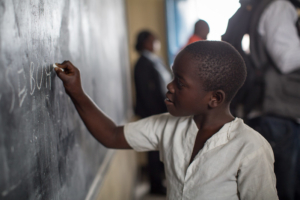UNICEF’s Action Against Child Displacement in the DRC
 The Democratic Republic of the Congo (DRC) is the largest country in sub-Saharan Africa, with a population of nearly 100 million. The DRC is rich in natural minerals, hydropower potential and extensive arable land. However, most of the population is unable to benefit from this wealth. The DRC faces political instability, autocratic leaders and long-term conflict. The country is in a humanitarian crisis, with much of the population, including children, experiencing displacement and extreme poverty. Many nongovernmental organizations (NGOs) are providing aid to help people affected by displacement, such as UNICEF’s action against militia-induced child displacement in the DRC.
The Democratic Republic of the Congo (DRC) is the largest country in sub-Saharan Africa, with a population of nearly 100 million. The DRC is rich in natural minerals, hydropower potential and extensive arable land. However, most of the population is unable to benefit from this wealth. The DRC faces political instability, autocratic leaders and long-term conflict. The country is in a humanitarian crisis, with much of the population, including children, experiencing displacement and extreme poverty. Many nongovernmental organizations (NGOs) are providing aid to help people affected by displacement, such as UNICEF’s action against militia-induced child displacement in the DRC.
Militia-Induced Child Displacement in the DRC
Much of the DRC is controlled by militia rebel groups, with territories seized on a regular basis. Its east and north provinces experience the most unrest, with violent killings of adults and children, as well as the ransacking of homes, schools and health centers. Families are often separated and forced out of their villages into crowded settlements without safe water, health care and basic services. More than eight million people in the DRC are “acutely food insecure.” Alongside the internal displacement of its citizens, the DRC also hosts refugees from neighboring conflict-affected countries.
Children are being recruited as militia fighters and subjected to sexual assault, violence and separation from their families. Rebel forces have displaced three million children from their homes. The Rwandan-backed M23 rebels are causing mass displacement of civilians and humanitarian organizations in eastern DRC. Recently, militia forces shelled refugee camps in the region, killing 17 people, most of whom were children.
UNICEF’s Mission
Without urgent humanitarian aid, children will continue to suffer. Malnutrition, disease and displacement to unsafe areas are causing high child mortality rates. UNICEF faces challenges while delivering aid due to dangerous environments and weak transport infrastructure for delivering resources. However, UNICEF’s action against militia-induced displacement of children in the DRC, alongside other national partner NGOs, works to provide urgent basic services. These include tarpaulins for shelter, cooking utensils, clean water and sanitation. It also has three long-term initiatives:
- Safe Spaces: UNICEF collaborates with local governments and NGOs to provide safe spaces for children. It focuses on providing protective services for survivors of sexual violence, forced military recruitment and separation from their families. In addition to providing physical protection, UNICEF also provides mental health and psychosocial support.
- Health Care: Militia groups have invaded many health care centers. The rebels use the premises to set up bases, cutting off basic health services to the population. UNICEF provides support to primary health centers in conflict areas. In 2023, these centers reached more than 375,000 children younger than 5.
Children are provided with health checkups, including routine and emergency immunizations, to prevent the outbreak of diseases such as polio. UNICEF is also responding to the latest cholera outbreak. The organization provides communities with safe drinking water and water treatment kits. The NGO has people on the ground providing decontamination services for homes, as well as prevention techniques such as awareness and surveillance. - Education: Educational institutions have also been overrun by rebels forcing children out of education. In response, UNICEF has built temporary education units to allow displaced children the opportunity to continue their education safely. It provides school supplies, remedial classes, psychotherapy support and encourages peacebuilding activities.
The Future
In 2019, the DRC appointed a new president, Félix Tshisekedi. He promised major reforms in a bid to transform the country’s image of poverty and war into a growing economy and a favorable place for investment. With support, the Congolese government is attempting to overthrow militia groups and reassert authority in the country.
Similarly, in 2022, the World Bank Group set up the Country Partnership Framework (CPF). This four-year strategy promotes the stabilization and development of the DRC. A large focus of the CPF is on human development and improving essential services such as education, health and social welfare. In 2023, the DRC received more than $8.6 billion from the World Bank to fund 23 development initiatives.
The DRC still suffers from fragility and conflict. However, missions such as UNICEF’s action against militia-induced child displacement in the DRC and the Country Partnership Framework are having positive impacts on the country’s security, economy and the well-being of its people.
– Millie Trussler
Millie is based in London, UK and focuses on Global Health and Politics for The Borgen Project.
Photo: Flickr
